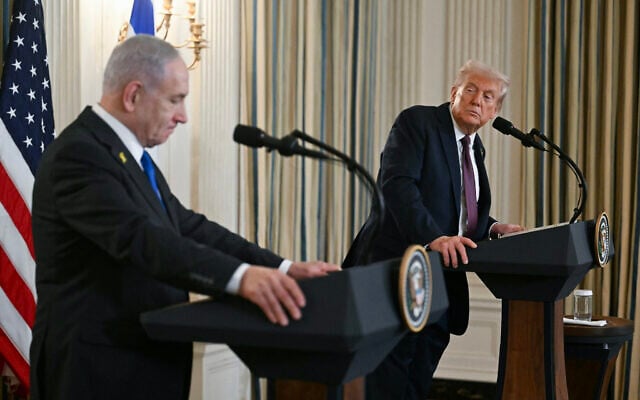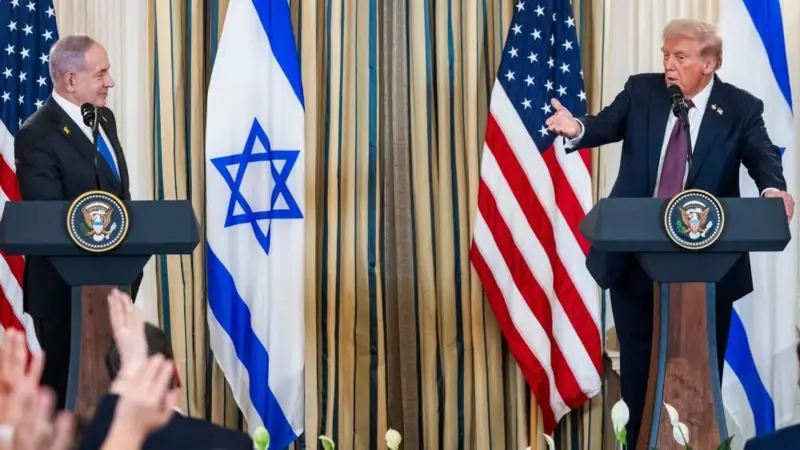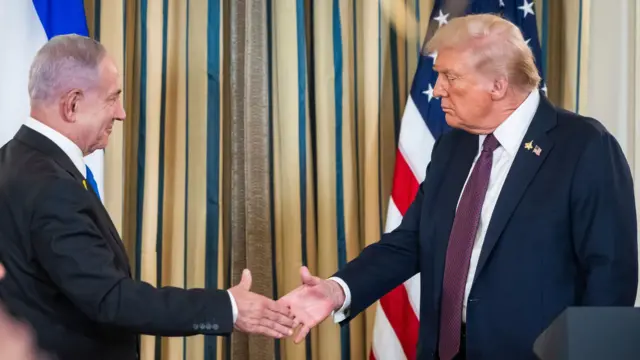Introduction
In recent weeks, international debate has once again been shaped by Trump news, as former U.S. President Donald Trump outlined his vision for peace in Gaza. The proposal, which some describe as bold and energetic, has generated strong reactions across the political spectrum. Veteran journalist and Middle East analyst Jeremy Bowen has summarized the dual nature of the plan well: its momentum is its greatest strength, while its lack of detail is its most dangerous weakness.
The plan has managed to reignite discussion about a conflict that has persisted for decades, but it leaves critical questions unanswered. To understand its strengths and weaknesses, it is important to examine how momentum works in diplomacy, why detail matters in peace-building, and how global actors perceive Trump’s approach.
The Role of Momentum in Diplomacy
Momentum is not just a concept in politics; it is the driving force that keeps negotiations alive. In a conflict like Gaza, where mistrust, historical grievances, and failed peace processes dominate, momentum can break through paralysis.
Trump’s ability to generate headlines and capture global attention is a political skill he has demonstrated throughout his career. His Gaza plan benefits from this. Unlike traditional peace proposals that take months of preparation before they reach the public, Trump often prefers unveiling big ideas quickly and with a sense of urgency. This creates immediate traction and forces stakeholders to respond.
Supporters argue that this momentum is refreshing. For decades, Gaza peace efforts have moved at a glacial pace, often bogged down in technical negotiations and competing political agendas. By pushing the conversation forward and demanding immediate consideration, Trump injects energy into an issue that has long felt stagnant.
Momentum also appeals to the media. In the age of 24-hour coverage, Trump news commands attention in ways that few political figures can match. This visibility means his Gaza plan cannot be ignored, even by his critics. In this sense, Bowen’s observation is accurate: momentum is indeed the strongest element of Trump’s initiative.
The Fragility of Detail
Yet diplomacy requires more than speed and energy; it requires substance. This is where Trump’s Gaza plan falters. The lack of detail in the proposal raises concerns not only among analysts but also among those directly affected by the conflict.
Some of the unanswered questions include:
-
Security guarantees: How will the plan ensure safety for both Palestinians and Israelis in an environment where violence often escalates suddenly?
-
Humanitarian aid: Gaza faces severe humanitarian challenges, from limited access to clean water to chronic shortages of medical supplies. How will aid be delivered and distributed under Trump’s vision?
-
Political recognition: What role will Palestinian leadership play, and how will their demands for statehood and sovereignty be addressed?
-
Implementation strategy: Even if both sides agree in principle, what mechanisms will monitor and enforce compliance?
Without detailed answers, the plan risks being dismissed as political theater rather than a serious roadmap to peace. Momentum may start the conversation, but without a clear structure, it cannot sustain long-term progress.
 Historical Context: Trump’s Diplomatic Style
Historical Context: Trump’s Diplomatic Style
To understand the strengths and weaknesses of Trump’s Gaza plan, it is useful to place it in the context of his earlier foreign policy decisions. During his presidency, Trump demonstrated a preference for bold, disruptive moves rather than cautious, incremental diplomacy.
The recognition of Jerusalem as Israel’s capital is a prime example. It was a decision that created enormous momentum, reshaping the debate about the Israeli-Palestinian conflict overnight. Supporters praised it as a long-overdue acknowledgment of reality, while critics warned it undermined Palestinian claims to East Jerusalem. The decision drew global headlines, but the details of how to reconcile competing claims were never fully addressed.
The same can be said of the Abraham Accords. These normalization agreements between Israel and several Arab states generated excitement and diplomatic momentum, but they largely bypassed the Palestinian issue, leaving it unresolved.
Trump’s Gaza plan follows a similar pattern: big on impact, short on detail. Bowen’s analysis suggests that unless this pattern changes, momentum alone will not lead to lasting peace.
Global Reaction to the Gaza Plan
The world’s response to Trump’s proposal has been divided. In Israel, many officials welcome the renewed focus on security and peace, believing Trump to be a strong ally of the state. His ability to frame the conversation in terms favorable to Israeli leadership is seen as a political advantage.
On the Palestinian side, however, skepticism runs deep. Many view Trump’s past policies as biased toward Israel and fear that the new plan will not adequately address their aspirations for sovereignty and justice. For Palestinians, the lack of detail in the plan is particularly troubling, as they see it as evidence that their needs are once again being sidelined.
International actors, such as the European Union, remain cautious. While they acknowledge the importance of maintaining momentum, they emphasize that peace can only be achieved through concrete, balanced, and enforceable measures. The United Nations has also stressed the need for a detailed framework that respects international law and humanitarian principles.
The Risk of Momentum Without Detail
Momentum is valuable, but it is also fragile. In the absence of detail, it can quickly turn into disappointment. If expectations rise without concrete results, trust among stakeholders erodes. This is particularly dangerous in a conflict as sensitive as Gaza, where years of failed negotiations have already created deep cynicism.
Diplomatic history shows that momentum must be paired with careful planning. The Oslo Accords in the 1990s generated enormous excitement, but their failure to address key details — such as borders, settlements, and the status of Jerusalem — eventually led to renewed violence. Without addressing root causes, even the most energetic peace efforts can collapse.
Trump’s plan risks falling into this same trap. Bowen’s warning is clear: momentum may be its strength, but detail is the foundation upon which any peace must be built.
Trump’s Political Calculations
It is also worth noting that Trump’s Gaza plan exists not only in the realm of diplomacy but also in the context of American politics. With elections looming, bold international proposals often serve domestic political purposes. Trump news plays well with his base, many of whom view him as a strong leader capable of standing up to international pressure.
By emphasizing momentum, Trump positions himself as a man of action — someone who can achieve in months what others have failed to do in decades. However, the absence of detail raises doubts about whether the plan is truly designed for peace, or whether it is intended more as a campaign tool.
 The Path Forward
The Path Forward
For Trump’s Gaza plan to succeed, it must evolve beyond momentum. Detail is not a luxury in diplomacy; it is the very substance of peace-building. Negotiators will need to establish clear security frameworks, humanitarian guarantees, and mechanisms for political recognition.
Moreover, both Palestinians and Israelis must feel that their concerns are taken seriously. Without buy-in from both sides, no plan — regardless of momentum — can succeed.
International actors will also play a crucial role. The United States can generate momentum, but lasting peace requires broad support from the global community, including regional powers, the European Union, and the United Nations.
Conclusion
Jeremy Bowen’s observation captures the essence of Trump’s Gaza plan perfectly. The initiative benefits from enormous momentum, driven by Trump’s ability to dominate headlines and force the world to pay attention. Yet its lack of detail threatens to undermine that very strength, leaving it vulnerable to skepticism and failure.
As with much Trump news, the world is divided: some see a bold vision for peace, while others see little more than political theater. The real test will come in whether Trump can move beyond momentum to build a detailed, credible framework that addresses the realities on the ground.
In the end, peace in Gaza cannot be achieved through momentum alone. It requires patience, precision, and compromise — qualities that will determine whether Trump’s proposal becomes a turning point in history or just another missed opportunity in one of the world’s most enduring conflicts.

